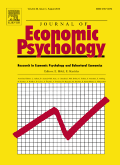
JOURNAL OF ECONOMIC PSYCHOLOGY
Scope & Guideline
Innovating Understanding of Economic Behavior Through Psychological Lenses
Introduction
Aims and Scopes
- Behavioral Economics and Decision-Making:
The journal extensively examines how psychological factors influence economic decisions, including risk assessment, loss aversion, and fairness perceptions. - Social Norms and Cooperation:
Research often delves into the role of social norms, trust, and cooperation within economic interactions, highlighting how these factors shape collective behavior. - Gender and Economic Behavior:
A consistent focus on gender differences in economic decision-making, exploring how identity and societal expectations impact choices and outcomes. - Experimental Methods:
The journal employs rigorous experimental methodologies to investigate economic behaviors, allowing for causal inferences about psychological influences on decision-making. - Financial Literacy and Behavior:
Studies frequently address the impact of financial literacy on economic choices, particularly in relation to saving, investing, and consumer behavior.
Trending and Emerging
- Impact of Emotions on Economic Decisions:
An increasing number of studies explore how emotional states, such as fear and anxiety, affect financial decision-making, underscoring the importance of psychological well-being in economic behavior. - Technology and Economic Behavior:
Research on the influence of technology, including the effects of smartphone usage and online platforms, on trust and decision-making is gaining prominence, reflecting the digital transformation of economic interactions. - Intergroup Dynamics and Cooperation:
Emerging themes focus on intergroup relations and their impact on cooperation and trust, particularly in diverse social contexts, highlighting the psychological underpinnings of economic cooperation. - Meta-Analyses in Behavioral Economics:
There is a growing trend towards meta-analytic studies that synthesize existing literature on topics such as loss aversion and trust, providing comprehensive insights into behavioral economic principles. - Gender Dynamics in Economic Contexts:
Research increasingly emphasizes the complexities of gender dynamics in economic decision-making, including how gender identity and societal roles influence economic behavior.
Declining or Waning
- Traditional Economic Models:
The reliance on classical economic models without psychological integration appears to be waning, as the journal increasingly prioritizes interdisciplinary approaches that incorporate psychological insights into economic behavior. - Narrowly Defined Risk Behaviors:
Research focusing solely on specific risk behaviors without considering broader psychological contexts is becoming less frequent, as the journal shifts toward holistic analyses that encompass various influencing factors. - Static Observational Studies:
There is a noticeable decline in static observational studies that do not utilize experimental methods. The journal is favoring experimental designs that can better establish causation.
Similar Journals
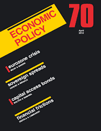
ECONOMIC POLICY
Transforming Economic Discourse Through Rigorous AnalysisECONOMIC POLICY is a leading academic journal published by Oxford University Press, focusing on a broad spectrum of topics within the field of economics and related disciplines. With its ISSN 0266-4658 and E-ISSN 1468-0327, the journal serves as a vital platform for disseminating cutting-edge research and innovative policy analysis critical to both scholars and practitioners. As a testament to its quality and significance, ECONOMIC POLICY is classified in the Q1 quartile for both Economics and Econometrics and Management, Monitoring, Policy, and Law, and boasts impressive rankings within Scopus—placing it in the top 25% of its respective fields. Operating from the esteemed Oxford campus in the United Kingdom, the journal has produced a wealth of knowledge since its inception in 1988, with plans to continue shaping economic discourse through 2024 and beyond. While the journal does not offer Open Access options, it remains a cornerstone for anyone dedicated to understanding the complexities of economic policy and its impact on global society.
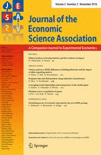
Journal of the Economic Science Association-JESA
Pioneering Research for Impactful Economic SolutionsJournal of the Economic Science Association (JESA), published by SPRINGER, stands as a pivotal platform in the realm of economic research, focusing on innovative theories and methodologies that challenge conventional economic paradigms. With its ISSN 2199-6776 and E-ISSN 2199-6784, JESA fosters a rigorous academic environment for scholars, practitioners, and students to exchange ideas and findings that shape our understanding of economic phenomena. Although the journal is not open access, it is committed to disseminating high-quality research that contributes to the economic sciences, making meaningful impacts on both policy and practice. Hailing from its esteemed office at One New York Plaza, Suite 4600, New York, NY, the journal aims to enhance the visibility of groundbreaking research and encourages submissions that delve into diverse aspects of economics. Join the intellectual discourse within its pages to contribute to the advancement of economic knowledge and practice.

BASIC AND APPLIED SOCIAL PSYCHOLOGY
Innovating the Intersection of Theory and ApplicationBASIC AND APPLIED SOCIAL PSYCHOLOGY is a distinguished academic journal published by Routledge Journals, Taylor & Francis Ltd, that has served as a pivotal platform for scholarly discourse in the fields of social and applied psychology since its inception in 1980. With an ISSN of 0197-3533 and an E-ISSN of 1532-4834, it showcases cutting-edge research that aims to bridge the gap between theoretical frameworks and practical applications. It is notable for its strong performance as reflected in its 2023 Scopus rankings, placing it in the Q2 quartile for both Applied Psychology and Social Psychology, highlighting its impact and relevance in these domains. Researchers, professionals, and students alike will find an array of original articles, reviews, and empirical studies designed to deepen understanding of the social forces shaping human behavior. Although the journal is not open access, it remains an essential resource for anyone looking to enrich their knowledge in social psychological principles and practices. Addressed from the United States, the journal is well-regarded within the international academic community, making it a prominent choice for publishing influential research in the social sciences.
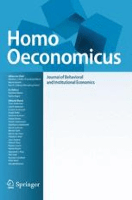
Homo Oeconomicus-Journal of Behavioral and Institutional Economics
Exploring the Nexus of Behavior and Institutions in EconomicsHomo Oeconomicus - Journal of Behavioral and Institutional Economics is a reputable academic journal published by Springer Heidelberg, dedicated to exploring the intersection of behavioral science and institutional economics. With its ISSN 0943-0180 and E-ISSN 2366-6161, the journal aims to disseminate high-quality research articles that bridge theoretical constructs and practical applications in economic behavior and institutional frameworks. It offers a vital platform for researchers, professionals, and students to engage with cutting-edge debates, innovative methodologies, and empirical analyses that inform our understanding of economic decision-making processes. Although currently not an open-access journal, Homo Oeconomicus remains influential in shaping the academic discourse within its field, making it essential reading for those passionate about economics, social science, and related studies. For further insights and contributions, subscribe to this pivotal journal, and join the conversations that are redefining economic principles in contemporary society.
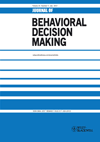
JOURNAL OF BEHAVIORAL DECISION MAKING
Illuminating the pathways of human decision processes.The JOURNAL OF BEHAVIORAL DECISION MAKING, established in 1988 and published by WILEY, stands as a leading academic platform dedicated to advancing the understanding of decision-making processes through a behavioral lens. With its ISSN 0894-3257 and E-ISSN 1099-0771, this esteemed journal enjoys a prominent global presence, particularly in the United Kingdom. Its impressive impact is reflected in its 2023 category quartiles, achieving Q1 rankings in both Arts and Humanities and Sociology and Political Science, and Q2 rankings in Applied Psychology and Decision Sciences. The journal features rigorous peer-reviewed articles that bridge theoretical and practical research, making it an invaluable resource for researchers, professionals, and students alike. Its commitment to fostering interdisciplinary dialogue is further highlighted by its Scopus rankings, placing it among the top percentile in various categories. While not currently an open-access journal, the access options cater effectively to a wide audience, ensuring the dissemination of critical insights into behavioral decision-making practices. Join the vibrant community of scholars who are pushing the boundaries of this vital field of study.

Nature Human Behaviour
Illuminating the intersection of behavior and society.Nature Human Behaviour, published by Nature Portfolio in the United Kingdom, stands at the forefront of interdisciplinary research, connecting the fields of Behavioral Neuroscience, Experimental and Cognitive Psychology, and Social Psychology. With its commitment to publishing groundbreaking studies, this prestigious journal is categorized within the Q1 quartiles for 2023, indicating its elite status and significant influence in the academic community. Recognized globally with a remarkable Scopus ranking of #1 in multiple psychology and neuroscience categories, it showcases the highest quality research, thus appealing to students, professionals, and researchers alike. Despite being a subscription-based journal, its impactful scientific discourse continues to shape understanding of human behavior in social contexts. With the ambition to elucidate the complexities of human interaction and cognition, Nature Human Behaviour serves as an essential resource for anyone dedicated to advancing the realm of human behavioral sciences.

ACTA PSYCHOLOGICA
Advancing psychological science for a global audience.ACTA PSYCHOLOGICA, published by Elsevier, is a leading journal that has served the field of psychology since its inception in 1936. With an impact factor that reflects its authority and significance in the discipline, this journal has become essential for researchers, professionals, and students alike. Open Access since 2021, ACTA PSYCHOLOGICA ensures that groundbreaking psychological research is widely accessible, promoting the dissemination and application of knowledge across various branches of psychology including Developmental and Educational Psychology and Experimental and Cognitive Psychology. The journal is categorized in the Q1 and Q2 quartiles, highlighting its high-quality contributions to the field, supported by robust rankings within Scopus. Located in Amsterdam, Netherlands, this journal remains a vital resource for advancing psychological science and fostering collaborative research worldwide.
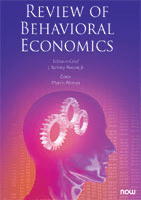
Review of Behavioral Economics
Innovating Understanding in Behavioral EconomicsThe Review of Behavioral Economics, published by NOW PUBLISHERS INC, is a distinguished academic journal that focuses on the intersection of economics and psychology, shedding light on the behavioral dimensions that influence economic decision-making. With an ISSN of 2326-6198 and E-ISSN of 2326-6201, this journal serves a critical role in advancing theoretical and empirical research within its field, noted for its rigorous peer-review process. As recognized by its strong performance metrics, it holds a Q2 ranking in both Economics, Econometrics and Finance and Social Sciences categories, as well as a Q3 ranking in Social Psychology for 2023, underscoring its relevance and impact. Researchers and practitioners can access cutting-edge findings and comprehensive reviews that address contemporary issues in behavioral economics, providing invaluable insights for both academia and applied contexts. With a publication span from 2019 to 2024, the journal is a pivotal resource for those aiming to navigate and innovate within this dynamic field.

JOURNAL OF SOCIAL PSYCHOLOGY
Empowering scholars to shape the future of social psychology.JOURNAL OF SOCIAL PSYCHOLOGY, established in 1930 and published by ROUTLEDGE JOURNALS, TAYLOR & FRANCIS LTD, is a revered platform in the field of social psychology, distinguished for its commitment to advancing the understanding of individual and group behavior. With an impressive Q2 ranking in the 2023 category for Social Psychology and a notable 67th percentile position in Scopus rankings, this journal serves as a critical resource for researchers, professionals, and students seeking to explore the latest empirical research, theoretical advancements, and application in social psychology. Although it does not provide open access options, the journal ensures high visibility and rigorous peer review processes, making it a trusted source for high-quality scholarly articles. As it converges its publication from 1930 to 2024, it continues to be at the forefront of scholarly dialogue, shaping the discipline's future.
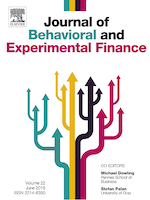
Journal of Behavioral and Experimental Finance
Decoding Financial Behavior for a Better TomorrowJournal of Behavioral and Experimental Finance, published by Elsevier, stands as a premier outlet for groundbreaking research in the realm of finance, particularly focusing on the psychological and behavioral factors that influence financial decision-making. With an ISSN of 2214-6350 and an E-ISSN of 2214-6369, this journal has established itself within the top tier, achieving a Q1 ranking in Finance for 2023, and is currently positioned 10th out of 317 journals in the Scopus category of Economics, Econometrics and Finance, demonstrating a remarkable 97th percentile ranking. Aiming to bridge theoretical advancements with practical applications, the journal encourages submissions that explore innovative methodologies and empirical studies, offering valuable insights for academics, practitioners, and students alike. As a vital resource for those interested in the confluence of psychology and finance, the Journal of Behavioral and Experimental Finance is pivotal in shaping the future of financial research and practice.